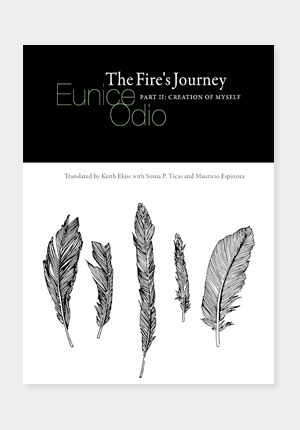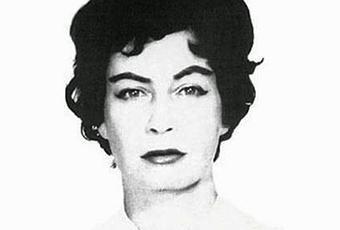For years, Tavern Books, a small independent publisher out of Portland, has been quietly producing excellent, exquisite books. Their mission is to bring high quality projects that may have flown under the radar--by foreign and domestic authors--to American readers. Everything Tavern does is top shelf, especially their two-volume translation of The Fire's Journey, a 1957 epic poem by the famed Costa Rican poet Eunice Odio. Translated by San Francisco poet Keith Ekiss, with help from Sonia P. Ticas and Mauricio Espinoza, The Fire's Journey is the first book length translation of any Costa Rican woman poet. Part I, "Integration of the Parents," appeared in 2013, and Part II, "Creation of Myself," has just been released. Parts III and IV will appear in the near future. My strong advice is to get in on the ground floor now of this fantastic series.
Odio's poem of self-making echoes Neruda, Walt Whitman, and The Bible (though not in that order) and perhaps even predicts Gabriel Garcia-Marquez's One Hundred Years of Solitude. It is an ambitious, over-reaching origin tale in which the self and the world take shape together. The essential, almost primal opening lines of "Integration of the Parents" could have been penned by any of the authors mentioned above
I think myself, I cast myself in a hollow of shadow
from the highest contour of the blood
to the closest hipfrom the skin to the light entering through dawn
from the shadow to the lips
climbing up through the syllable
but section two reveals an uncertainty one might read as humility missing from Odio's male counterparts:
Nothing hails me, nothing knows me.
All things are weightless; they are all remembering themselves:the curl thinking through the air
the skin in a hard wave of wheat without corners
the smile in the inhabited power of a single wing.
Whitman's bluff optimism enables him to imagine all of creation waving at him, and depending on who you are, you either love or hate him for that. While Odio's epic of self-realization shares much with Whitman's Song of Myself, hers tends to swerve the poetic camera away from the self, preferring instead to zoom in on that which surrounds her. Volume I reminded me a great deal of another largely overlooked Latin American epic poem, the colossal Altazor, by Neruda's arch enemy Chilean Vicente Huidobro. Both Huidobro and Odio invent an alter-ego (Altazor for Huidobro, Ion for Odio) who sort of floats in and out of the physical world, the imagined world, the natural world, and the interior world.
The boundaries between interior and exterior are of great interest to Odio, or at least to Ion, who I imagine speaks for Odio. Ion is a poet-warrior (the best kind of alter-ego) and is the only entity who can bring peace to the universe. To do this, however, he must battle "The Void," who is shapeless and formless and who wants to return the universe to chaos and darkness: "If we ourselves lose, the Void shall be born again / as he was before."
If you are saying to yourself, wow, that feels like an allegory for poetic creation, you win the steak knives. It is also a little window into how consequential many poets (myself included now and then) wish poetry actually was. What if the only way to save the universe was for the a poet to confront the void?
Thank god that's not the case.
The Void defeats most of us on a daily basis. But, Ion, like Odio, is special, in part because he is aided by the great mythological builder, Daedalus, who once imprisoned The Void. Much of volume two consists of a dialogue between Ion and Daedalus, with the appearance of a Chorus here and there to help narrate and move along the action. Daedalus is a kind of Robin to Odio's Batman or a Q to Odio's James Bond. Ultimately, though, Ion takes it upon himself to risk everything in order to bring form to formlessness, voice to silence. His only weapons--the language of poetry:
DEDALUS
There is only an atrocious verb that surrounds himION
A scattered verb,
quiet and malevolentDEDALUS
You shall fly like a burning arrow,
you shall return annihilated wordsION
I shall return from his embraceDEDALUS
Then, will you have become yourself?
At times those who approach his boundary
believe they return
but it is he, he who returns
in the form of the departed one.
The main motif of the poem is actualization--making the self integrated and visible. Worthy. A good deal of Ion's dialogue reveals his insecurity about being able to summon language heroic and powerful enough to defeat The Void. In this new era of doubting, self-reflexive superheroes, Ion comes across not only as relevant but as groundbreaking.
Near the end, Ion is birthed into the world via a great river, and in so doing arrives in body, spirit, world, and language at the same time and ready for action:
DEDALUS
It's time. Make yourself visible.ION
WaitDEDALUS
Reveal yourself through your forehead, it is time.ION
It is time to reveal myself through my body
Much of the poem carries Biblical overtones, and this note of revelation is not accidental. Ion's arrival is a revelation many years and many drafts in the making. The poem is both primal and predictive.
It is a tribute to the translation that Odio's version--so resonant and passionate in Spanish--works as well as it does in English.
The temptations for the translator of The Fire's Journey are many. On one hand, there are gender issues one might feel compelled to tinker with. Why does Odio make her poet-hero a man? Also, to our ears in this second decade of the new millennium, aspects of the poem can come across as grandiose or even farcical. To his credit, Ekiss avoids making Odio's project sexier or more over-the-top than it actually is. I could see a less skilled writer (Ekiss is a fine poet) fumble the ball and turn Odio's masterpiece into a neo fantasy like Game of Thrones or amp up the sci-fi a la The Twilight Zone. But, Ekiss strikes the right chord both formally and thematically. He shows restraint when lesser translators might give in to drama and hyperbole. He also knows when to led Odio's lyricism shine through the philosophy.
A great translator sublimates his or her own ego in favor of the ego of the poet being translated, and this version is the right balance of Ekiss and Odio.
With Federico Garcia-Lorca and Pablo Neruda in the news, there is a renewed interest in Twentieth Century poetry in Spanish. Much this work has been written by men, but Odio is a fascinating departure. Ion's mythic, ambitious, dangerous journey reminds us of just what is at stake with language.



